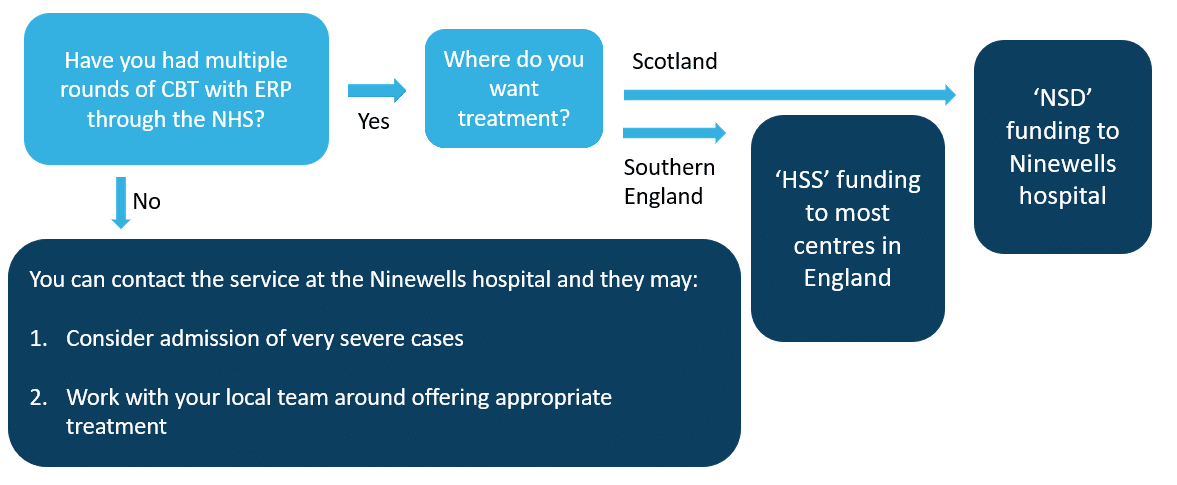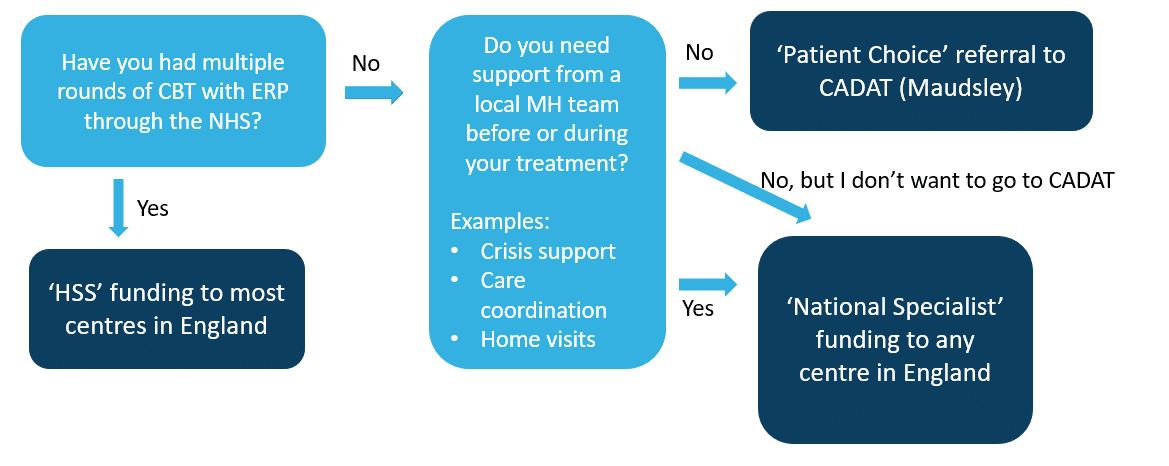Each local area has a designated Local Health Board that makes decisions about what services to ‘commission’, or pay for. In England this is called the Clinical Commissioning Group (CCG).
When someone needs an assessment or treatment from a service outside their local area, the Local Health Board must approve it first. The idea behind this is that your local area won’t pay extra for a service that isn’t needed, so you and your doctor need to show that it is. There are a few different pathways that can be used to secure funding for specialist treatment, depending on where you live and what service you need. The option that is available to everyone is the ‘National Specialist’ funding.
.
Which funding route is right for me?
Below, you can click on your area to see what funding options are available to you, and which might be most appropriate based on your individual situation.
You can access tertiary / specialist treatment through the ‘National Specialist’ funding route.
You can access tertiary / specialist treatment through the ‘National Specialist’ funding route.
You can find more information in the appendix about the service at the Ninewells hospital on our Tertiary care page.

Please note – the flowchart below can act as a rough guide to the options available. To get a clearer idea of which option best suits you, you can refer to the details about individual specialist centres on our Tertiary care page. You can also read about the funding options in more detail below.

.
Funding options
This is the ‘traditional’ referral pathway, usually led by your consultant at the Community Mental Health Team (CMHT). Sometimes, though, it can be done by a GP or other professional.
Your consultant would make an application for funding to your Local Health Board. Depending on your area, this might be called an IFR (Individual Funding Request). You can find tips about putting together a strong funding request on our Funding requests page.
The funding needs to be approved by the Local Health Board so that you can be seen by the specialist service. This could be done in two stages (assessment and then treatment) or all at once.
NHS England and NHS Scotland have additional options available for certain situations, and which can be much easier to secure than traditional ‘National Specialist’ funding, if you fit the criteria.
NHS England has a designated ‘pot of money’ that it can use to fund the treatment of the most serious and hard to treat cases. NHS Scotland contributes to the pot, so Scottish residents are also eligible.
This pathway has much stricter requirements than others, but anyone who meets them will have the funding approved. To meet the criteria for this funding, you must meet all three of the following:
-
- A high score on an OCD or BDD scale
30 or above on Y-BOCS (for adults with OCD) and CY-BOCS (for children with OCD)
36 or above on the BDD-YBOCS (for people with BDD)
OR Your consultant can also provide a statement about how severe your symptoms are instead of a score - Unsuccessful treatment through therapy
2 rounds of ‘adequate’ CBT with EPR (for adults)
1 round of ‘adequate’ CBT with ERP (for children) - Unsuccessful treatment through medication
1 round of an SSRI (for children)
2 rounds of SSRIs, plus a round of augmentation, (for adults with OCD)
2 rounds of SSRIs (for adults with BDD)
OR if you are unable to take a full round of medication (3 months) because of your condition or because of the side effects you experience, the medication requirement can be dropped on a case by case basis
- A high score on an OCD or BDD scale
Patient Choice is a legal right under the NHS England constitution, which allows patients to choose where they want to receive treatment. Basically, if you could access it locally, you have a right to access it anywhere else in England and your CCG will pay for it.
Technically, this option can’t be used for specialist-level treatment, because it has to be for something you could access locally. Luckily, the CADAT at the Maudsley hospital offers treatment at all levels. This means that you can get a Patient Choice referral to their ‘non-specialist’ services, where you would still be treated by therapists who are experts in OCD.
This funding can only be used for a single round of therapy from CADAT, with no ‘extras’. So if you need support while you are waiting for treatment (for example, home visits from a mental health nurse or crisis support to keep you safe) then this is not an appropriate option.
The National Services Division of NHS Scotland funds the specialist OCD service at the Ninewells hospital, in Dundee. This means that treatment at this service is already funded for Scottish residents who are eligible. For more information on eligibility criteria for the Advanced Interventions Service, please see the appendix in our Tertiary care page.
